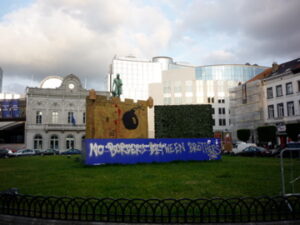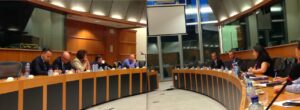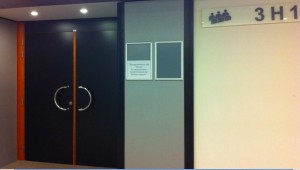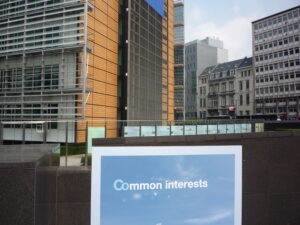Engaged Anthropology Grant: Bilge Firat

Bilge Firat is Lecturer in the Department of Humanities and Social Sciences at Istanbul Technical University. In 2008, while a doctoral student at the State University of New York, Binghamton, she received a Dissertation Fieldwork Grant to aid research on ‘The Negotiation of Turkish Europeanization in Brussels,’ supervised by Dr. Thomas M. Wilson, investigating how lobbying as a politico-cultural communicative practice works in facilitating the enlargement dynamic of the E.U. towards the Republic of Turkey. In 2013, now on the faculty of Istanbul Technical University, Dr. Firat received the Engaged Anthropology Grant and used it to organize a unique opportunity for political actors who would normally not be in dialog with each other to discuss political and cultural issues outside of a formal context.
Europeanization alla Turca? A Communicative Engagement Event Towards the Positive Agenda
While conducting my Wenner Gren-supported dissertation fieldwork on Turkish Europeanization and lobbying in Brussels, I observed Turkey’s European Union (EU) membership talks (or accession negotiations, in Eurospeak) to gradually undergo a stalemate from 2008 to 2009. This stalemate, or rather crisis, has since then impelled actor-agents to rethink the fundamentals of the EU-Turkey relationship. In this rethinking, I found, mutual mis/trust, pedagogical power, and other political currencies loom large. At the end of my research in Brussels, I concluded that various dynamics rendered Turkey’s bid for EU membership an anti-case. Communicative setbacks arising from existing power parameters between the EU and this candidate country contributed into the disintegration of actors and agents from one another, which in return contributed into the deepening of mistrust and the losing of political and administrative credibility among members of Turkish and non-Turkish Eurocratic policy communities—otherwise equal partners in this process. I observed mistrust as a strong political currency most commonly in policy actors’ non-communication with one another outside the given communicative channels and tokens provided by an institutional framework. I recently went back to Brussels, thanks to a Wenner Gren Engaged Anthropology Grant, in order to bring together public and private negotiators of Turkey’s EU accession to discuss the nature of this anti-case and to amend their communicative holdups.[1]
In my engagement project, I proposed to nurture a para-ethnographic moment in the form of a roundtable discussion wherein participants, who would otherwise not speak to each other, were to do so by way of my mediation/meditation and to establish a new communicative channel unguided by official policies and formal institutional identities—prerequisite for establishing a sound politico-cultural dialogue and moving on with the process.

Please take off your political hats!
These were the exact words with which the Europeanization alla Turca roundtable that I organized at the European Parliament (hereafter, the Parliament) on 17 September 2013 started. My guests included public (governmental and non-governmental) and private interest representatives from the European Union, its member states, and Turkey who have been entrusted with facilitating Turkish bid for EU membership over many years now, but many of whom have lately been estranged from one another—both personally and institutionally. About 25 policy workers congregated in Room 3H1 of the Parliament’s Altiero Spinelli Building that Tuesday evening, in order to openly debate how past achievements and limitations in the everyday of negotiations could be turned into future opportunities for the EU-Turkey relations.
I have long ago observed that the EP serves as a market place where information, interests, and influence frequently exchange hands. A Greek Member of the EP and Vice-Chair of the Delegation to the EU-Turkey Joint Parliamentary Committee from the Progressive Alliance of Socialists and Democrats political group, Maria Eleni Koppa, kindly hosted us. In her opening remarks, she declared that Europe is a “community of values.”[2] The rest of us, after her, began to debate what this “community of values” entails for doing the daily work on the EU’s enlargement towards Turkey.

With Turkey, everything is political
Four speakers (including myself) reflected at that statement deriving from their European experiences and expertise from working with each other. Historical dept of the variegated relationship between Europe and Turkey was juxtaposed to the current impasse in the EU-Turkey membership process, which has its own landmark developments such as the signing of a customs union agreement between the EU and Turkey in 1996. The current deadlock in membership talks, or rather the “death spiral” as one of the speakers aptly put it in policyspeak, is plainly because “with Turkey, everything is political.” All speakers agreed that, at the individual bureaucratic level, this death spiral deepens the peculiar absence of mutual trust, lack of understanding of one another, as it further obliterates chances for the attainment of a common language between the parties to Turkey’s European tango.
“We need to build trust by living together,” stated Ms Fazilet Cinaralp, a true Turkish European and the long-term Secretary General of the European Tire and Rubber Association, a pan-European sectoral business association that also has Turkish members. “Accession is a process, and the industry is participating in this process daily with its challenges, prospects, opportunities,” she continued adding that more needs to be done.
Europe enlarges..
The venerable representative of Turkish Businessmen and Industrialists Association in Brussels, Dr. Bahadir Kaleagasi remarked, “Europe enlarges, but this is not an inclusion. Nobody comes to Europe; Europe goes to those places.” He recommended that we listen to European expats (businessmen, artists and the like) living in China, who as a result of this have a unique perspective on the future of Europe, of China, and of Turkey and are very much in favor of the EU enlargement towards Turkey. In his opinion, the real questions are whether there is any will left in both sides and which interests the EU and Turkish citizens have in common. “A Europe that has successfully enlarged itself in a global order, or a shrinking Europe? Or a Europe of variable geometry where an enlarged EU could keep its core Eurozone, which may be easier to explain to its citizens.”

A better language, a real understanding
An adviser to the EU’s techno-bureaucracy on energy issues, who wished to speak off-the-record, stressed the importance of proper political communication. He suggested that the way actors and agents of Turkey’s Europeanization negotiations address each other is very important, whether it is done formally or informally in a non-structured or structured environment. He confided: “There has to be a real understanding of what the other person is hearing rather than what you are saying. And we lack that deeply on both sides.” From his long-term engagement with Turkey, this adviser summed up some of the turbulence in Turkey’s EU membership talks: “There have been many capable diplomats in both sides who knew how to approach an issue. But it only takes one person to say something stupid, and that throws off the entire relationship.”
The roundtable provided a platform for the participants to share their experiences with each other. Others such as officials from European Commission’s various directorate generals, civil society actors from the European Economic and Social Committee and the Committee of Regions also made interventions from around the table. It was not an easy task to bring them together, especially as an anthropologist with no institutional or political attachment in Brussels. But in the end, we were able to take off our hats that evening, albeit for a brief moment.
[1] I would like to acknowledge the help and support I received from two individuals in organizing this event: Aslihan Tekin and Evangelos Tountas, my long-time and more recent friends.
[2] Ms. Koppa was the only person who was not asked to take her political hat off, anticipating that a politician could never agree to that.